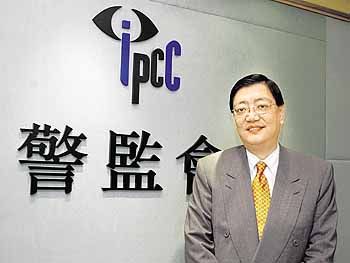Standing on neutral ground
 Middle man: IPCC lay observer Dr Charles Koo
Middle man: IPCC lay observer Dr Charles Koo |
Dr Charles Koo is a man on a mission. He wants police officers to understand that the presence of independent observers at complaint investigations was just as important for those accused as it was for complainants.
A prominent member of the Independent Police Complaints Council Observers Scheme, Dr Koo said many officers remained doubtful of lay observers.
"Officers, particularly Junior Police Officers, may be against the presence of lay observers in interviews, but they misunderstand our role. We are there to ensure the process is open and conducted fairly without any prejudices. And this works both ways, for the complainant and the officer."
Appointed when the scheme first started in September 1999, Dr Koo has since observed over 130 interviews - roughly one a week. A finance and communication consultant by profession, he has also been Wan Chai District Fight Crime Committee Chairman since 1998.
"It is a very useful scheme in the sense we understand more about the nature of complaints and provide feedback to Police in improving their service quality. I have spoken with officers from Wan Chai Division and their feedback was very favourable.
"They understand the scheme and agree we should have it, and realise it improves the quality of officers as they garner a better understanding of what the public want."
Lay observers enhance the monitoring function of the IPCC through scheduled and surprise visits to Complaints Against Police Office investigations. Observers can access case evidence, but cannot interfere in the investigation process or talk to witnesses.
They can clarify points with CAPO investigators such as the investigation procedures used, and pass on comments and observations on the conduction of the interviews.
Dr Koo said most complaints were avoidable trivial matters such as rudeness and unnecessary use of authority, and appealed to officers to ensure they engaged the basics in politeness.
"During operations such as stop-and-search, just a simple 'thanks for your co-operation' at the end of the check makes a huge difference to an officer's image. We have found some who just say 'okay, you can go now', which is no good."
He said many people who even acknowledged they broke the law, did not wish to comply with officers bearing such attitudes.
"A little courtesy greatly helps officers avoid complaints, and from my observations, officers are really improving their manner."
He said most officers followed correct procedures and often it was the complainant who was ignorant to police processes.
"One example was a case involving a woman beeping her car horn. She became aggrieved because she thought the responding officer was pinpointing her.
"However, she later realised that the officer was right as there were regulations regarding the proper use of horns," he said.
"So it is not just officers, it is also the public who need more awareness on police service quality and the complaints mechanism.
"Having a lay, independent observer not only gives the public more confidence their complaint is being fairly heard, but also better assures officers when they face unreasonable or false accusations. Having a third party provides more overall transparency."
<< Back to Index >>